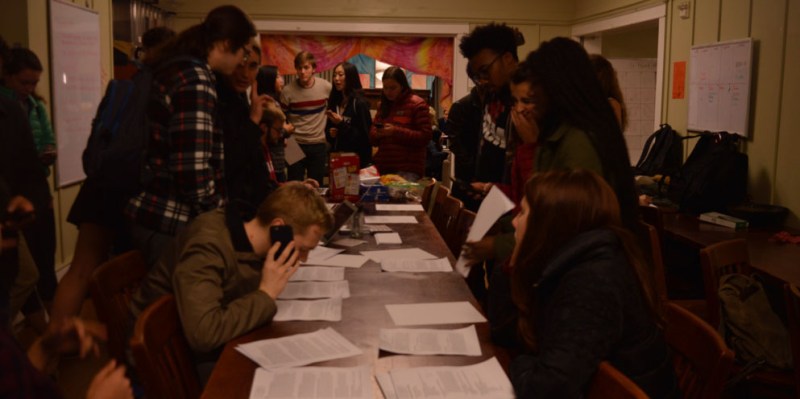As a burgeoning culture of anti-Trump political action takes hold at Stanford, some campus groups aim to make it easier than ever for students to influence politics at the federal level.
Stanford students’ willingness to engage in activism has increased following President Donald Trump’s controversial actions, according to a number of student leaders. The campus cultural shift has inspired students to create a political action website called CallToWin.org and galvanized the establishment of various events such as Political Action Parties at Columbae and a phone bank to stop the confirmation of Betsy DeVos. The shift has also augmented existing campus groups that engage in politics.
This diverse array of action and innovation shares common short-term and long-term goals. Immediately, the groups aim to facilitate students’ communication with their elected representatives through phone calls and letter writing campaigns in order to more effectively fight the Trump administration. Overall, however, they hope to contribute to the sustainability and coordination of the political left’s resistance effort.
Sam Kurland ‘17, Alex Feldman ‘17, Michael Rover ‘19 and Chapman Caddell ’20 are among the students most involved in the launch of CallToWin.org, the recent political effort closest to Stanford’s “techie” roots. The website allows users to search for the phone numbers of their senators and other representatives by just inputting their zip code. From there, CallToWin.org provides tips and scripts for making an effective phone call.
The CallToWin.org team, which Kurland approximated is “equally divided” between people doing coding work and people doing political research, has created an extensive database of information that has already registered users in more than 20 states.
“[The genesis of CallToWin.org] brought us to a place where we could offer something,” Rover said. “For some of us that was coding experience, and other people among us were very experienced with writing short issue statements.”
The diversity of backgrounds on the CallToWin.org’s team is reflected in the initiative’s target user group, which extends beyond those already experienced in political action.
“It’s really great if the tool helps people who are already calling to make more succinct and effective calls, but really the biggest win is when we get somebody to call for the first time,” Kurland said, adding that a main goal is to “lower the barriers” to getting politically involved.
Caddell added that CallToWin.org will greatly benefit from phone banking events, such as the one Bryce Tuttle ’20 hosted on Feb. 3 in an effort to stop the confirmation of DeVos. DeVos was appointed secretary of education in a historically narrow vote.
Tuttle strongly opposed DeVos because of what he calls her “complete disregard and misunderstanding of [student] disability rights.” His “hastily organized” phone bank sprung up in a moment of political urgency.
“I suddenly got a New York Times alert that the vote had changed to 50/50,” Tuttle recalled. “I already knew hundreds of phone banks were being arranged across the country, so I decided that I wanted to arrange one here as quickly as possible. Within 20 minutes of having the idea, I left class and organized something.”
The event, which lasted an hour, was an “encouraging experience,” Tuttle said. An estimated 20 to 25 people made calls to their respective senators to voice their opposition to DeVos.
“I liked the idea that some extra phones were ringing in Capitol Hill because we were doing something,” Tuttle reflected.
However, Tuttle worried that the current wave of political activism will be short-lived without “a core group of politically active people” on campus to create “something concrete that’s organized and continually operating.”
Penelope Edmonds ’19, a regular participant in Columbae’s political action parties, also commented on the need for centralized organization of anti-Trump action to increase the sustainability of the movement.
“There needs to be a more widespread calendar of events happening on campus, [since] there are a lot of events that happen that just go under the radar,” Edmonds said, stressing the need to “create a channel to increase attendance at events.”
Even so, Stanford students’ increased activist spirit has been apparent to many existing student groups, who recently have been able to engage more students in political action.
Representatives from Stanford’s chapter of J Street U, an intercollegiate pro-Israel and pro-peace organization, had unprecedented success at a tabling event obtaining signatures on a petition opposing Trump’s pick for the U.S. Envoy to Israel, David Friedman.
“People are definitely more willing to sign petitions, call people and just come to the table more than they would before,” said Julia Daniel ’17, one of the students running the tabling effort. “People are coming up and are interested in what’s going on. I think there’s more mobilization.”
As a constituent of Senator Lisa Murkowski (R-AK), who joined Senator Susan Collins (R-ME) as one of two GOP senators who opposed DeVos’ confirmation, Kurland has seen firsthand how a groundswell of political action can make a real difference.
“That was really inspiring because it showed that people getting engaged on the individual level — just picking up the phone and taking one minute to make a call — ultimately flipped a vote in the Senate,” Kurland said. “We lost at the end of the day, but I do think Senator Murkowski and Senator Collins really illustrated there how important it is for folks to get engaged in this way.”
Contact Katie Keller at ktkeller ‘at’ stanford.edu.
